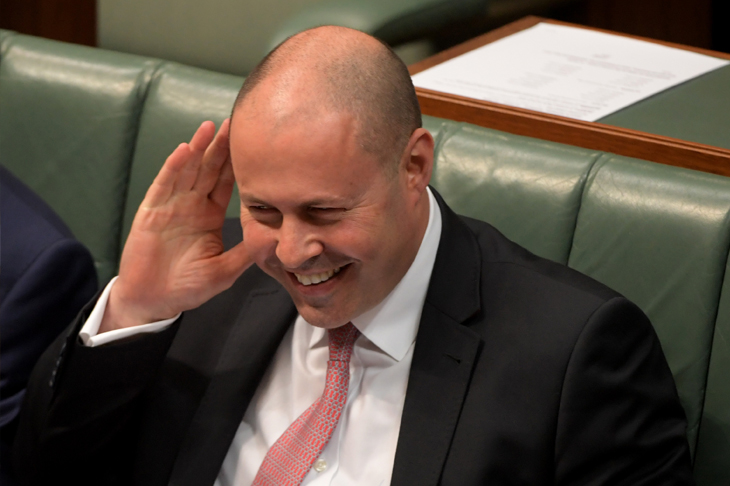Josh Frydenberg, the Treasurer of Australia and Deputy Leader of the Liberal Party, last week wrote an opinion piece in the Oz extolling – wait for it – the state of federalism in this country. It was a paean of praise to ‘one-size-fits-all’-ism, centralism and uniformity. If you sat down to pen a satire you couldn’t do better. I was half-waiting for Mr Frydenberg to praise the Chinese example of having only one time-zone for the whole country, such was his apparent love of the sort of lock-step uniformity he came to praise, not to bury.
So we read that Australia’s world’s worst vertical fiscal imbalance (where the centre collects 80 per cent of tax revenue but the state’s have big spending obligations so have to be ‘given’ money from the centre, often with strings attached – a massive imbalance no one in the democratic federalist world is looking to copy) is actually a jolly good thing. You see, it allows ‘citizens to share equally in the prosperity of the nation, irrespective of where they live’. Mr Frydenberg must not realise that in the US, Germany and Canada – all wealthier than here and wealthier in part because they have real, functioning federalism – citizens also share in their country’s prosperity. More on that in a moment. Let’s take some more ideas from the Frydenberg magnum opus.
He praises Australia’s horizontal fiscal equalisation scheme, one even more virulent than Canada’s and one that so aggressively rewards states doing badly and refusing to develop their mining and other resources at the expense of states that are entrepreneurial and risk-taking that it is hardly unfair to characterise it in socialist or even Marxist terms. Praise, Mr Frydenberg, should be made of sterner stuff.
But it gets better. Our Treasurer then suggests Australia’s founders, who gave us one of the world’s oldest continuously in operation written constitutions that was explicitly premised on strong states (however much our High Court has undermined that clear original intent and handed virtually every power going to the centre), would not really have been federalists if they could do it again today. ‘It has been said (here Josh opts for the passive voice to half distance the coming idiotic claim from himself) that if our founding fathers started again with a blank sheet of paper, knowing what we know now, they might not have landed on the federal system we have’. Well no, Josh, they’d have landed on the one they first drew up, real competitive federalism that has made Germany and Switzerland and the US and Canada the richest democracies on earth. These are countries where the states have their own income tax power, where vertical fiscal imbalance is significantly smaller than here, where states are not mendicants begging to the centre, where different parts of the country compete and innovate, with the poor performers pressured to copy the better performers.
Reading Josh you get the notion he thinks the founders would have copied a French-style unitary state with virtually all powers residing at the centre. Sure, that’s what they’d do Josh. It’s worked so well in France that they’re now up to their 14th or 15th written constitution. (Some of you might even have heard of the visiting Australian law professor who wandered into a book store in Paris on the left bank and asked to buy a copy of the French Constitution, to which the owner replied ‘Sorry sir, we don’t deal in periodicals’.)
Go and read Mr Frydenberg’s words for yourself. If you’re like me you’ll get the feeling our Treasurer has had to attend a few too many Commonwealth public service ‘inclusion seminars’. So pick up your guitar, strum ‘Kumbaya’, hear Josh talk about how ‘as our federation evolves and we work together across all levels of government’ and try not to vomit.
No, no, no. Federal systems deliver for their citizens for various reasons. For instance, they foster competition across the country in a way French centralism does not. Frankly, I thought Liberals were supposed to believe in the powers of competition but if you can find the slightest hint of that in Frydenberg’s piece you should become a detective.
Secondly, real federal systems satisfy more citizens’ preferences. It’s exactly by having different rules, not one-size-fits-all ones, that you make more people better off. Take some issue that divides the country 51-49. Legislate from the centre and loads are unhappy. But legislate at the state level (on mining, say, or school curricula as regards sex education, what have you) and you get differences but also more people happy with the rules under which they live. Competition and different rules are why Switzerland is consistently one of the world’s richest countries.
Look, Tony Abbott had it right with his big review of federalism in this country, one that Mr Turnbull should never have cancelled after his defenestrating take-over. And even Malcolm had it right – words I virtually never utter – when he offered the states income tax power. Mr Frydenberg’s views on federalism are a massive step down from Messrs Abbott and Turnbull, and that’s saying something.
Here’s the nub of the matter. Democratic countries with a functioning federalism (so not us, thank you High Court of Australia which overwhelmingly sides with Canberra on the big cases) are wealthier than unitary systems. And they have fewer public servants per capita too – and if that seems counter-intuitive just think about one-size-fits-all Australian universities which now have about two-thirds of all employees not being in the classroom or publishing, or think about the percentage of public servants in France.
Want a practical example? When John Howard opted to centralise labour relations in this country with WorkChoices, based on an incredibly implausible view of the heads of powers that pathetically the High Court signed off on, the then PM got a short-term liberalisation of labour relations. But once centralised always centralised and the Rudd-Gillard-Rudd years used that new central power to take us way, way back. Is there any doubt those of us who believe in freer labour markets, as presumably the Liberal party does, would be better off with what existed before Mr Howard grabbed these powers for the centre? No. There’s no doubt at all.
Go back to school Josh and learn how federalism is supposed to work.
Got something to add? Join the discussion and comment below.
Get 10 issues for just $10
Subscribe to The Spectator Australia today for the next 10 magazine issues, plus full online access, for just $10.
You might disagree with half of it, but you’ll enjoy reading all of it. Try your first month for free, then just $2 a week for the remainder of your first year.














Comments
Don't miss out
Join the conversation with other Spectator Australia readers. Subscribe to leave a comment.
SUBSCRIBEAlready a subscriber? Log in